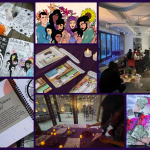When I lived in Africa and worked on girls’ education and HIV/AIDS prevention issues, I encountered what was known as the Sugar Daddy phenomenon.
In various countries in Africa, girls are the first to be pulled from school when money in a family is tight. They’re also the last to eat, and the last to receive basic necessities like health care or clothes. Busy with caring for siblings or fetching water, they also often go without much attention or sense of self-worth.
But Sugar Daddies are more than willing to make up for that.
Older men, usually with means, they prey on these young women–sometimes as young as 11, 12, 13. At first, they just show them attention, maybe by paying school fees or purchasing a new uniform. Then, they might take a young woman out to dinner or pay for her to have her hair done.
All innocent enough. Until he begins to convince her that she owes him and that her debt can be repaid with sex.
I got all too used to seeing this in various African cities and villages, where poverty is rampant and there are few social services to assist vulnerable youth who may fall through the cracks into such situations.
Of course, now I’m all too used to hearing about it happening on K Street, in my city’s schools, throughout the region where I live. In our nation’s capital.
It’s not okay that this happens to children anywhere, but there is something about it happening in one of our country’s wealthiest cities, just blocks and miles from the White House and Capitol Building, that I’m not sure I’ll ever get used to.
Which is why I was so pleased to attend an event on Tuesday evening hosted by Fair Fund–a Grantee Partner of The Women’s Foundation. The event brought together members of our community to learn more about how human trafficking and sexual exploitation are impacting youth in Washington, D.C.
About how young men and women in this city are routinely entrapped by pimps who start out as friends or boyfriends and then demand a return on their kindness with sex, first with them, and then with others.
And thus the cycle of entrapment in sex trafficking continues, here in Washington, D.C. just as it does throughout the world.
Here though, we are fortunate to have a committed coalition of activists, including Fair Fund and a number of other nonprofits and Grantee Partners of The Women’s Foundation (including Polaris Project, WEAVE, Latin American Youth Center, SMYAL, AYUDA, DC Rape Crisis Center, and Ascensions Community Services), who are all working together to break this cycle by advocating for a safe house to take teens to when they are pulled out of dangerous situations and building awareness among teachers, social workers and police officers throughout our community who can help identify, assist and protect young people who fall into this trap.
To learn more about this important work or to get involved:
Fair Fund’s new report documenting these trends locally: Pathways Into and Out of Commercial Sexual Exploitation
3-minute interview with Fair Fund’s Executive Director Andrea Powell in the DC Examiner
WAMU radio piece on Fair Fund’s work and local sex trafficking
To learn more about how to get involved, visit FairFund.org.
Lisa Kays is Director of Communications at The Women’s Foundation.



